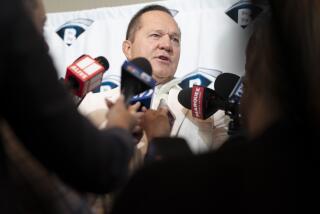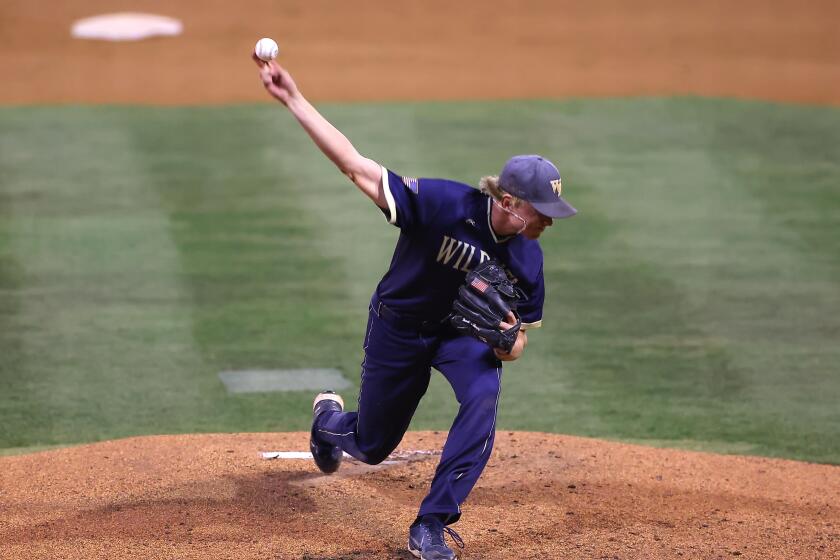Players Reject Pension Offer by the Owners : Sides Appear to Be Far Apart; Ueberroth Weighs Own Bid
- Share via
The baseball owners made a pension offer to the players’ union Tuesday, but the union’s reaction was that, if anything, it made a major league strike next week more likely.
Although the proposal signified that, after eight months of sparring, the sides are finally talking about issues, it was clear that they remain far apart on the numbers.
Based on recent salary trends, the owners’ proposal, which would peg annual pension contributions to the level of annual player salary increases, would decrease the annual pension contribution. The owners have been paying $15.5 million a year. The union is asking that the pension contributions continue to be one-third of what management gets from national TV. Under terms of baseball’s new TV contract, that would amount to $60 million.
Union leaders Donald Fehr and Marvin Miller said that if the owners intend to stick by Tuesday’s proposal, a strike next Tuesday is inevitable.
Meanwhile, Commissioner Peter Ueberroth said that he may make his own proposals.
Ueberroth said in an interview that he had met separately with both sides Monday and Tuesday to explore their positions and determine what avenues may be open.
He said he has not determined what, if anything, to propose, but said again that he will be representing neither the owners nor the players but the millions of fans who do not want a strike.
Over the weekend, Ueberroth had said he would not allow a strike. Tuesday, he said that a strike would represent an emergency for the 30 million Americans who listen to baseball on the radio, many of whom are retired or sick people unable to get out personally to attend games. He said that they would lose a cherished part of their lives for an indefinite period.
Ueberroth was asked whether there was a possibility that he would ask President Reagan to invoke the Taft-Hartley Act, with its 90-day cooling off period, against a strike, a period long enough to last beyond the World Series.
Ueberroth did not answer specifically. But in order to invoke the Taft-Hartley Act, the President would have to find that a baseball strike would “imperil the national health or safety.” That would seem to be somewhat farfetched and the first reaction from the U.S. Department of Labor Tuesday was that a baseball strike would not fit that criterion.
As Ueberroth edged toward full involvement in the dispute, the union’s Miller said that in a two-hour meeting with Fehr the commissioner had been “very vague” and that “everybody wonders” what he is up to. He characterized Ueberroth’s weekend speech about not allowing a strike as “bombast.”
Barry Rona, a negotiator for the owners, said that he had no idea what Ueberroth plans to do.
These were the main points of the owners’ pension proposal:
--The owners’ annual contribution to the players’ pension fund would rise from the current $15.5 million to $25 million, but only if the amount of annual player salary increases fell by more than half the present figure to $13 million or less.
--For every $1 million of salary increase beyond $13 million, the pension contribution would decline by $1 million. So, if salaries increased by the $34 million a year that the owners have projected, the annual pension contribution would decrease to $4 million.
--Salary arbitration for players would not begin until after three full years of service, rather than the present two, and an arbitrator could not award a player more than double his previous salary. There are no limits on that now.
--The re-entry draft would be abolished and teams that lost free agents would not be entitled to a professional player as compensation. They would instead receive amateur draft choices.
--No more than 10% of a player’s compensation could be deferred beyond the term of his contract, thus apparently ruling out some of the 20- and 30-year deals that have been reached in recent years.
Rona said that if the union accepted this proposal, the owners would drop their proposal for a salary cap, which Ueberroth has already opposed.
In that sense, he said, the owners are advancing their pension plan as an alternate means of reaching the same end, which he said is to bring organized baseball back to profitability.
That is an underlying issue in the dispute. The owners say the 26 clubs collectively are losing about $30 million a year, although some teams, such as the Dodgers, are profitable. The union disputes that, saying that baseball overall is making a profit, although some individual clubs are losing money.
Fehr and Miller said there is no way their membership of 650 major league players will accept any proposal that may lead to an absolute reduction in their pension benefits.
Miller said that since the last contract was signed in 1981, the clubs’ income for their national television contract has increased from $46 million to $180 million a year. Now, he said, the owners are offering the players only $9.5 million of this huge increase for their pensions and by pegging it to salaries have put themselves in the position where they in all probability would not even have to give that.
“As a result of today’s developments, things were set back appreciably,” Miller said.
Fehr said: “Plain and simply, this is not a proposal, it seems to me, that is designed to do anything except provoke a reaction that the players who were in the meeting had, which is that they must be crazy.”
Meanwhile, the U.S. Senate adopted without dissent a resolution urging the owners and players to resolve their dispute without a strike because, it said, both sides “have a responsibility to the baseball fans of America to ensure that the current season is not interrupted.”
More to Read
Go beyond the scoreboard
Get the latest on L.A.'s teams in the daily Sports Report newsletter.
You may occasionally receive promotional content from the Los Angeles Times.










